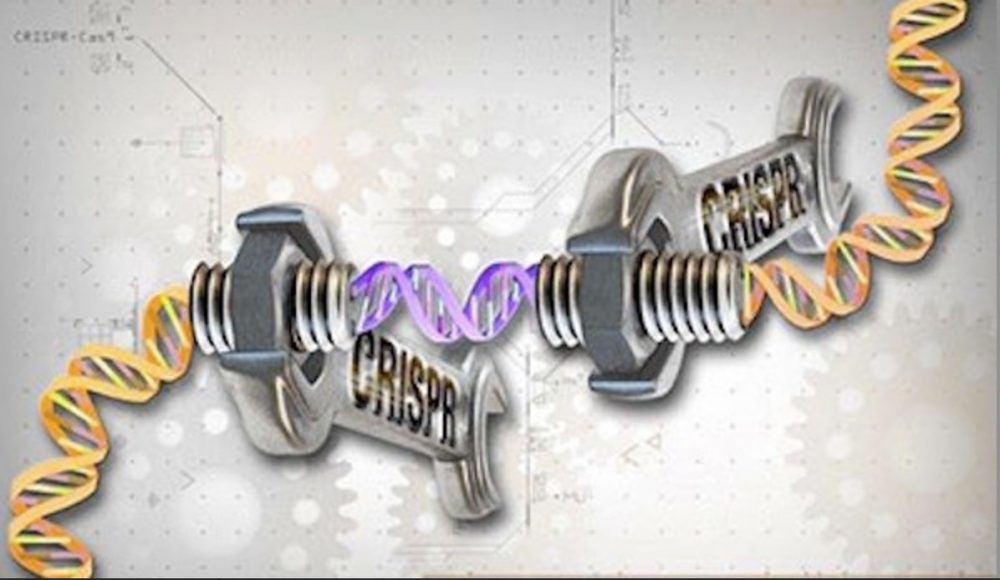Advertisement
The Ali-Frazier Fight Of Biotech? Patent Court To Hear CRISPR Oral Arguments

It's hard not to get hype-y about CRISPR, the gene-editing tool hailed as a revolution sweeping labs around the world. The same goes for the East Coast-West Coast patent fight over credit for CRISPR that some call the biotech battle of the century.
So indulge me for a moment: In that context, the oral arguments scheduled for Dec. 6 before three U.S. Patent and Trademark Office judges could perhaps be compared to boxing's "fight of the century," Muhammad Ali vs. Joe Frazier, right? (The CRISPR headliners are two stellar scientists: Feng Zhang of the Broad Institute of MIT and Harvard vs. Jennifer Doudna of the University of California, Berkeley.)
Hype aside, the courtroom scene about to play out offers a window into a world that's normally much lower-profile, but influences vast flows of money: patent law. I spoke with Associate Professor Paul R. Gugliuzza of Boston University School of Law, an expert on patent litigation.
What exactly is this Dec. 6 proceeding?
It's called an "interference." It's a process used by the Patent Office to determine who gets a patent when two or more parties have invented the same thing. Patent lawyers call this a fight over "priority" to the invention.
What are its possible outcomes?
One possibility is that the judges simply find that one party or the other is entitled to the patent. But such a clean outcome seems unlikely in this case because the interference proceeding involves several different patent applications as well as several patents that have already been issued. So it's possible, actually, that both parties could walk away with patents on various aspects of the technology.
Another possible outcome is that the parties could settle. But most people view a settlement as relatively unlikely here because the parties have already invested so much in this fight, and because there are many different companies that have already licensed the technology from the parties. So those companies have a strong interest in seeing their favorite party prevail.
But there could be a sort of a Solomonic decision by the court, in which they say, "You each get patents on various aspects"?
Right. One possible outcome is that the judges say, "Well, you actually haven't invented the same thing, and so each party gets patents on different aspects of the technology."
If you were a betting man, how would you bet?
I would not bet on the outcome of this case. The basic rule that applies to this dispute is that the patent will go to the first party to have invented the claimed technology. Determining who is the first to invent can be very difficult. It requires the judges to sift through mountains of documentary evidence, like lab notebooks, the results of experimental tests, draft manuscripts of journal articles, and other things like that.
Not only that, but the judges will also consider testimony from the inventors and other witnesses who were involved in developing the technology. Because they're so fact-intensive, outcomes of interference proceedings are notoriously unpredictable, and I think most patent lawyers agree that the CRISPR dispute is no different.
Why would a dispute come to this?
One thing that's important to note is that interference proceedings are somewhat unusual. The patent office receives about half a million patent applications each year, and it declares only about 50 interferences. So an interference usually involves an exceedingly important and valuable invention, such as the CRISPR technology.
Ownership of a patent here could be extremely valuable because CRISPR has all these great therapeutic uses. Whichever university owns that patent stands to make a lot of money by licensing the technology to companies that can develop commercial products based on it.
This is being called the biggest legal fight in biotech in a long time -- maybe ever. Does that seem to be true?
This is certainly a big fight. The technology seems very important and useful, or else the parties wouldn't be fighting as hard as they are. But it's important to note that interferences are often contentious. It's not unusual for them to cost the parties hundreds of thousands if not millions of dollars. It's not unusual for them to stretch on for decades.
The case that I use to teach my students about interferences was a priority fight between Bristol Myers Squibb and the University of Texas involving a method to identify cancer fighting drugs, and it took 16 years for that interference to be resolved, and that's not unprecedented. Another famous interference involving a patent on polypropylene lasted 30 years.
But ultimately, the outcome in the CRISPR case is likely irrelevant for future cases because the law has already changed, right?
That's right. As important as this case seems, its consequences for the future are pretty minimal, because the law of priority has changed. For things that are invented today, the patent is given not to the first person to invent but to the first person to file a patent application, which is usually much easier to determine. So within the next decade or two, interference proceedings won't even exist.
How do you see the public good here? Is a case like this ultimately good or bad for scientific progress?
Patents are all about striking a balance between providing incentives for innovation and making sure the technology is widely available. So we want to make sure those who invest in developing technology, as these universities undoubtedly have, are able to recoup their investment through exclusive rights for limited duration.
But one might certainly look at a dispute like this, where the parties have reportedly spent over $20 million in legal fees, and reasonably wonder if it's impeding rather than promoting the progress of science, which is the purpose of patent law.
